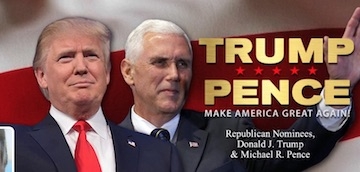Donald Trump's shock win is another body blow for economic stability and there already “textbook knee-jerk reactions” in the markets, analysts said this morning.
As Britain woke to find out that Hillary Clinton had conceded victory to her opponent – defying most forecasts that she would win – the investment and savings sector has been reacting to the news.
Calum Bennie, savings expert at Scottish Friendly, said: “Donald Trump's win is another body blow for political and economic stability in what has been a year of continued investor uncertainty. His victory raises very serious questions about the direction of politics in established western economies. The rise of right wing populism combined with a reaction against globalisation has now turned the table on its head and unleashed a wave of instability and insecurity which is likely to make the stock market a bit of a bumpy rollercoaster ride for the next few months.”
Nick Peters, multi asset portfolio manager, Fidelity International, said: “A Trump Presidency also feeds into greater political uncertainty and undermines confidence in the openness of the international system. While these are abstract risks and it’s difficult to assess how they will be priced in by markets, they are likely to at least depress sentiment. The best option for a Trump Presidency is that his policies are stymied by Congress, with even the Republicans likely to oppose certain proposals.
“For Emerging Markets however, there are significant risks. The US Presidency has substantial clout regarding EM sensitive policies, such as trade tariffs and barriers, renegotiating NAFTA or designating currency manipulators (with potential implications for China or Korea). While economic expediency could serve to limit the negative impacts, sentiment is likely take a ‘knee-jerk’ hit – especially in Mexico.”
Philip Smeaton, Chief Investment Officer at Sanlam Private Wealth (UK), said: “Trump is the wildcard president and one that few investors will be welcoming this morning. Trump’s policies would likely see a destabilised financial system and damaged international trade relationships. It’s not all doom and gloom though – Trump’s pro-business taxation policies may mitigate some of the damage done to the wider economy."
Russ Mould, investment director at AJ Bell, said: “A drop in stocks and gains in safe haven assets like the yen and gold are textbook knee-jerk reactions to unexpected events. However, once they sit down and think more clearly markets will need to consider long-term issues such as protectionism and inflation as potential dangers and a pro-growth agenda as a potential benefit when they address what a Trump Presidency may mean.”
He said: “Following on from the UK’s referendum vote in June, this reinforces the presence of political risk that has been absent from developed markets for most of the last two decades.”
The volatility may persuade the US Federal Reserve not to raise interest rates at its next meeting on 14 December, he believes.
Longer term, he said, on the plus side, markets would have usually welcomed a President whose agenda includes corporation tax cuts and a substantial (if still vague) infrastructure investment programme, “as both could boost a US economy which still appears to be stuck at stall speed”.
The biggest long-term downside risk is posed his protectionist or isolationist stance, he added.
Richard Stone, Chief Executive at The Share Centre, said: “Similar to Brexit there is every prospect that the market will over-react. It appears evident that Congress will be controlled by the Republicans.
“While potentially moderating some of Donald Trump’s more extreme positions, this also means there will not be the same level of stalemate between the President and Congress that there has in the past when they have hailed from different parties. In addition, Donald Trump is above all else, a pragmatic businessman. He has spent his life negotiating and in doing so knows the first statement of your position is not what you expect as the outcome.”

